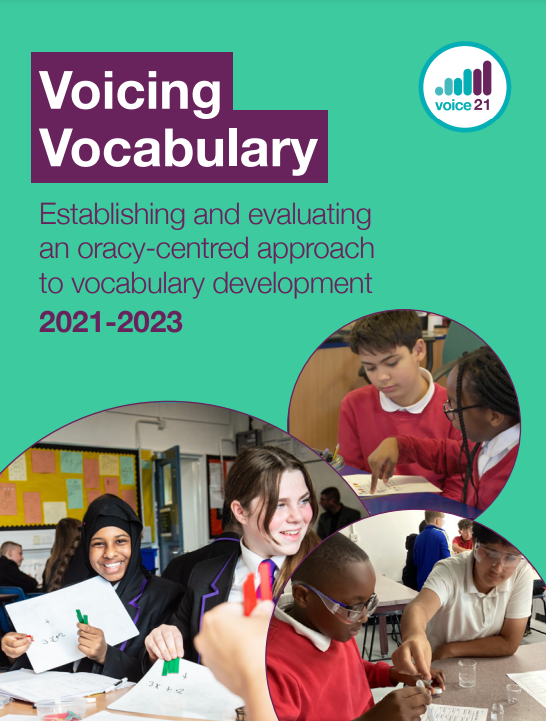Oracy-rich approach to vocabulary development accelerates students’ progress in reading.

Voice 21, today releases its highly-anticipated Voicing Vocabulary report, the result of a two-year research project examining how purposeful classroom talk can be harnessed to support vocabulary learning.
The report reveals that through an oracy-centred approach to vocabulary development, students made accelerated progress in reading. By the end of the project, students in Voicing Vocabulary schools were more likely to have an above average reading score than their peers nationally. And the impact was not only confined to test scores; participating students became more confident to speak up in class, both when discussing ideas in small groups and speaking to a larger audience.
In 2021, with the generous support of the Dulverton Trust, Voice 21 launched a two-year research project to establish and evaluate an oracy-led approach to vocabulary development at the primary-secondary transition.
Voice 21 partnered with twelve schools across three regions of England (the Black Country, Leicester and Pendle), to track students’ progress in reading as they transitioned from primary to secondary school, recognising this as a point when students encounter a significant increase in the quantity and complexity of vocabulary across the curriculum.
Using insights gained from student focus groups and teacher interviews, as well as evaluation of reading tests and surveys, the report identifies five actions that schools can take to harness oracy as an effective tool for vocabulary development.
Amy Gaunt, Director of Learning, Impact and Influence at Voice 21 says: “Research tells us that the size of a child’s vocabulary is a predictor of academic attainment and wellbeing in later life. We know that oral language is the most effective vehicle for learning new words; it is through hearing new language and using it in speech that children become able to read it, write it and deploy it with fluency.
In publishing this report, we hope we have added a valuable contribution to research surrounding the development of vocabulary, establishing oracy as an essential part of any discussion on how to improve vocabulary teaching in schools”.
Kathleen McBride, Project Lead for Voicing Vocabulary at Voice 21 says; “
As the national oracy education charity, we are committed to continually exploring and evidencing the impact of the explicit teaching of oracy on learning. We know that a high-quality, oracy-rich education has the capacity to improve both students’ academic outcomes and well-being, making talk one of – if not the most powerful tool at every teacher’s disposal.
We hope that this report will equip teachers beyond the project with the knowledge and tools they need to champion an oracy rich approach to vocabulary development in their own schools”.
Hannah Clark, a Year 6 teacher who participated in the project says: “We’ve seen how oracy is a great vehicle for teaching vocabulary. Having the children say a word, use it in a sentence and put it into a context really helps to deepen their understanding of it”.
Teacher Kerry Hutchins comments: “I don’t want my Year 6s to go up to high school and be at a disadvantage compared to their more advantaged peers and vocabulary has a huge role to play in them having the confidence to express their ideas and opinions”.
The full Voicing Vocabulary report can be read here.
© 2022 Voice 21. Voice 21 is a registered charity in England and Wales. Charity number 1152672 | Company no. 08165798